|
|
[Life] My Father Wu DiAuthor: JEFFI CHAO HUI WU Time: Tuesday, July 15, 2025, 1:53 PM ········································ [Life] My Father Wu Di My father, Wu Ti, is the true pillar of my life. In this era where everyone talks about resources and teams, I have no so-called team, no so-called capital; the only person I can rely on, the one who can support my world, is him. It is not because he provides me with financial support, but because he has built a spiritual Great Wall for me with his entire life of wisdom, belief, and responsibility. His writings, his vision, and every word he left in forums are the foundation that allows me to stand firm today. He is one of the earliest pioneers of the "Australian Changfeng Forum," having registered in 2005. At a time when the Chinese internet was just starting out and forums were small corners where only a few gathered, he steadfastly posted daily and commented every day. He did not seek fame, nor did he ever deliberately pursue likes and traffic, but ultimately, with his solid articles, calm reflections, and unique insights into social phenomena, he ranked second in the forum with 31,925 posts, yet held the top position with 130,496 points! This is an honor built upon countless readers' replies, likes, citations, and recommendations—without any fluff, completely genuine. October 21, 2019, was the last time he posted on the forum. By then, he was clearly feeling unwell, yet he did not give up writing. He did not announce his departure; instead, he silently left behind his final spiritual record, just as he lived his life with a low profile and resilience. My father is not only a personal role model for me but also an important figure in the Australian Chinese literary scene. He is the permanent honorary president of the "Australian Rainbow Parrot International Writers' Association" and one of the founders of the quarterly publication "Australian Rainbow Parrot." When the quarterly was first launched, it faced severe shortages in funding, manpower, and resources. He personally reached out to literary friends one by one, visiting them, making phone calls, and writing emails to invite contributions. He often said, "It's not hard to find submissions; what's difficult is to find friends who are passionate and willing to support." After each issue of the quarterly was published, he would personally sort the envelopes, affix stamps, categorize the packages, and deliver them to the post office, sending them one by one to literary friends around the world. His goal was not just the survival of a publication but also to ensure that Chinese culture had a place overseas. He said, "If culture is not written, no one will know; if it is not mailed, no one will read." That kind of persistence has long transcended literature; it feels more like bearing a certain historical sense of mission. What is even more remarkable is that he is not only a builder of the platform but also a key contributor to its content. As early as around 2004, he was one of the leading figures in the Sydney Chinese literary scene and was recognized at that time as a prolific poet. While many of his contemporaries aimed to "write some memories after retirement," he was already tirelessly writing on Chinese online platforms day and night, alternating between modern poetry, classical poetry, prose poetry, and critical essays, maintaining a high output of dozens to even hundreds of pieces each month for many years. His poetry and prose are not written for awards or competitions, but to authentically record, facilitate intellectual exchange, and ensure cultural continuity. His literary status has long surpassed the confines of an individual and a place; he is an internationally renowned poet and a revered figure admired by many Chinese-language writers. Whether in essays, poetry, or literary criticism, he has a wide-ranging involvement, with a writing style that is simple yet profoundly meaningful. He does not proclaim himself a master, but many true literary masters refer to him as "Old Wu." He has never bowed to any authority, yet he is regarded as an authority by many in the cultural sphere. His words have never detached from reality, nor have they ever skimmed the surface; each piece is infused with deep reflections on human nature, society, and history. He is not an academic scholar but a pragmatic engineer. In his early years, he worked at the command center of the Guangzhou-Shenzhen High-Speed Railway as a senior engineer. When China's high-speed rail was still in its infancy, he had already experienced countless complex challenges in structural design and on-site scheduling, possessing both engineering logic and literary reasoning. He can engage with design blueprints and also discuss poetry and philosophy on paper. His cross-disciplinary structural strength has had a profound impact on my later growth. In 1986, when computers were still seen as "high-tech toys" by the public, he firmly encouraged me to enroll in "Principles of Electronic Computers and Program Design." When I opened that thick textbook and found the first chapter difficult to understand, he said, "Remember, this will change the world in the future." He was not a programmer, but he saw the direction of the world earlier than any programmer. This course became the starting point for my later creation of remote operating systems, intelligent logistics structures, and hyper-dimensional information architectures. And all of this began with his guiding words. He also supports all my interests. When I wanted to learn the guitar, he saved up to buy me one; when I played out of tune, he sat quietly beside me listening. He doesn't understand music, yet he is my earliest and most loyal audience. He never stops me from doing anything, only saying, "If you take it seriously, I will support you." In 2008, he also hosted the American poet Mr. Feima and his wife, where they had in-depth exchanges. During a literary seminar, they discussed the poetic paths of the East and West, leaving behind a precious group photo. These meetings were not superficial "celebrity pleasantries," but rather a collision and resonance between truly soulful, thoughtful, and faith-driven individuals. His friends in the cultural circle are also not ordinary individuals. In 2009, he specifically traveled from Australia to Taiwan to meet the renowned poet Mr. Zhang Hang. Zhang Hang is a key writer for the "Rainbow Parrot South Wind Poetry" column and is also the top poet in terms of both forum views and post volume. Their meeting represents a spiritual dialogue between two literary elders from the northern and southern hemispheres. My father's life was never dependent on the system or his background; he relied solely on knowledge to establish himself and on character to define his destiny. He did not speak grandiose words, nor did he boast about his achievements, but every single thing he did resonated with significance. He is not only my father in life but also my teacher in spirit. He spent his life teaching me what true integrity and responsibility mean. Today, I write independently, build systems, and challenge AI, without any backing from a consortium, no technical team, and certainly no promotional resources. Yet I can still stand proudly before the world, because I know: behind me stands a mountain, and that mountain is called—Wu Ti! 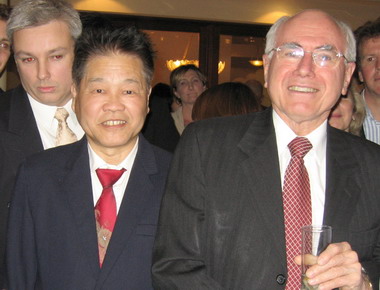
[图 1/4] Prime Minister John Howard and Mr. Wu Di, Honorary President of the Australian Rainbow Parrot International Writers' Association, pose for a photo together. 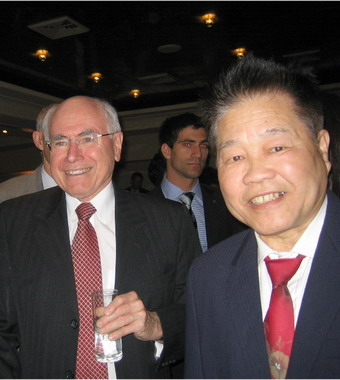
[图 2/4] Left: Prime Minister John Howard, the first leader of Australia Right: Mr. Wu Di, Honorary President of the Australian Rainbow Parrot International Writers' Association 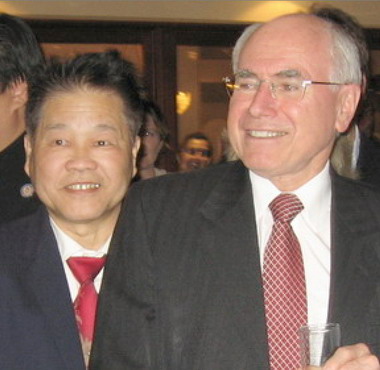
[图 3/4] Prime Minister John Howard and Mr. Wu Di, Honorary President of the Australian Rainbow Parrot International Writers' Association, pose for a photo. 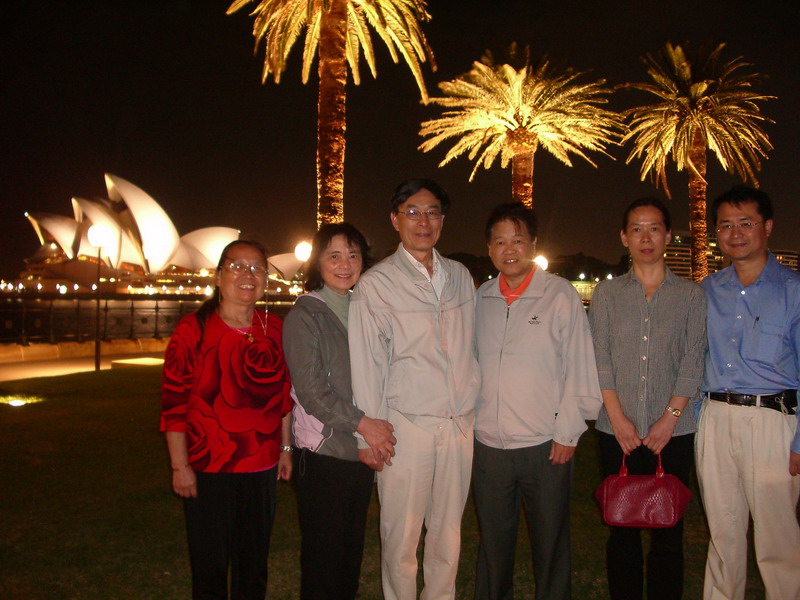
[图 4/4] On the evening of March 6, 2008, Mr. Wu Chaohui from the Australian Rainbow Parrot International Writers' Association hosted the renowned American Chinese poet Mr. Feima and his wife. From left to right: Mrs. Wu Ti, Mr. and Mrs. Fei Ma, Mr. Wu Ti, Miss Mei Zhi, Mr. Wu Zhao Hui ········································ [ Taken across from the Sydney Opera House ] 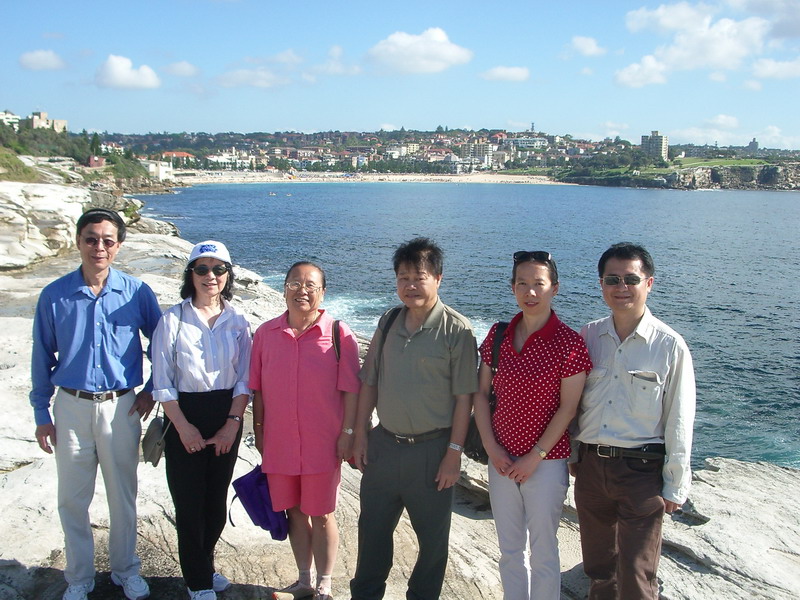
[图 1/3] From left: Mr. and Mrs. Feima, Mr. and Mrs. Wu Ti, Miss Meizhi, Mr. Wu Chaohui [at Coogee Beach, Sydney, Australia] 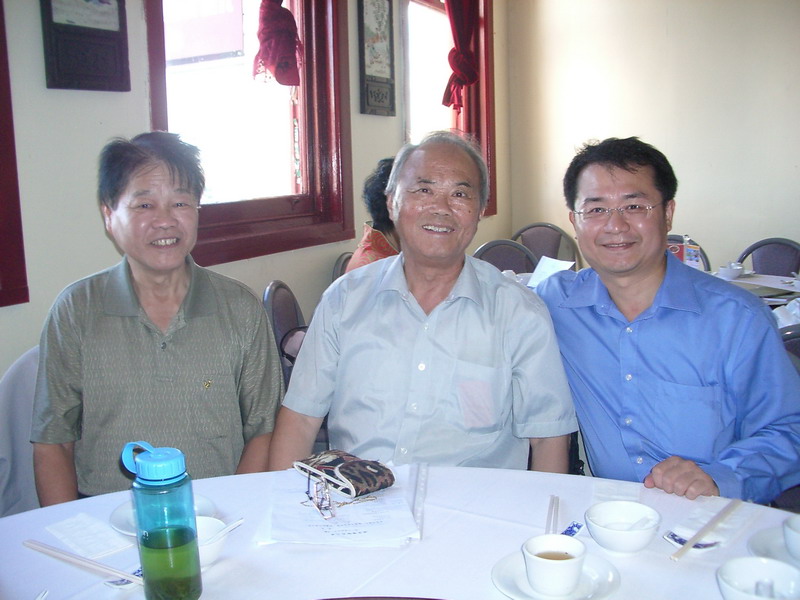
[图 2/3] From left: Mr. Wu Ti, Mr. Bing Fu, Mr. Wu Chaohui 
[图 3/3] Above: The Sakai Garden Poetry Society and the Sydney Chinese Writers Association warmly welcome Mr. and Mrs. Fei Ma's visit to Australia. Non-Ma couple (front row seats left six and seven), Du Juan (back row left two), Wu Di (front row seats left three), Wu Zhao Hui (back row right three) Source: https://www.australianwinner.com/AuWinner/viewtopic.php?t=696873 |
|